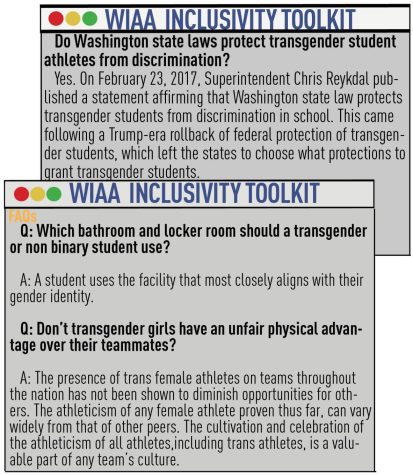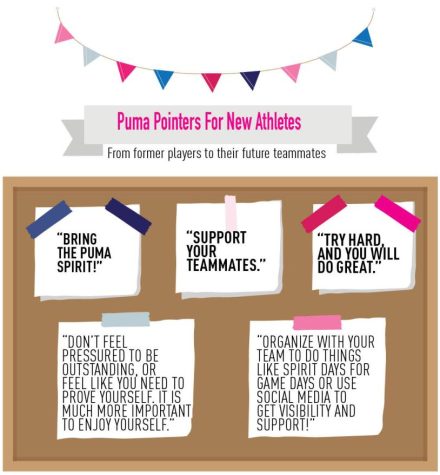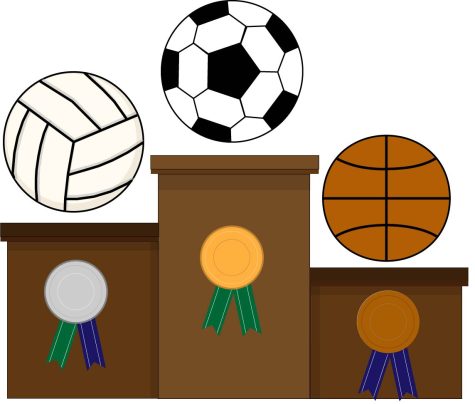Title IX Turns 50
UPrep alums and students reflect on Title IX and what it means to be a woman in sports.
This year marks the 50th anniversary of Title IX. The landmark civil rights law prohibits sex-based discrimination from taking place within all public institutions. Although University Prep is a private institution, Title IX set an important precedent for the role of women throughout the athletic community, from middle and high school athletes to professional players. Though Title IX was able to begin the shift in female participation in sports, there are still many hurdles female athletes must overcome.
Women in the Professional Sports Sphere
“If it weren’t for Title IX, I probably wouldn’t be here teaching,” P.E. Department Chair Kayla Robertson said.
Title IX made it possible for females to see themselves involved in sports on a professional level. For UPrep’s Director of Athletics, Rebecca Moe, representation played a key role in her willingness to take on an occupation in this field.
“When I was in high school, I had a female athletic director, so I never thought I couldn’t be one,” Moe said. “I really believe what they say, that you gotta see it to be it.”
After graduating from UPrep in 2006, Katherine Hopps played Professional women’s soccer for over 10 years. For Hopp, watching Brandi Chastain score the game-winning goal at the 1999 World Cup was a game-changer.
“I always admired all those women,” Hopp said. “But at that moment, is when I realized playing soccer at a higher level, possibly for the national team, was possible and something that I wanted to work towards.”
Hopp feels as though women in professional sports regularly have their athleticism questioned and overlooked due to comparisons to players of the opposite sex.
“We aren’t as fast as men, but like, you don’t need to compare us to men because we’re not men. Just appreciate our ability for what it is without comparing it,” Hopp said.
Through all the struggles that women in sports face, from being taken seriously to low viewership, Hopp has a lasting message she wants to share.
“I think females should be able to do anything and everything that they want to be doing,” Hopp said. “We shouldn’t have to ask why should a female play a sport. If they want to and they like it, then they should.”

Struggles Faced and Progress Made
According to Moe, a common challenge that she has faced as a woman with a position in power in sports is not being taken seriously as often as male athletic directors.
“Early on in my career, I was fairly young and had two small children. I remember one time being at the state basketball tournament about 15 years ago, and they had to have a supervisor for each section. And they’re like, who’s the UPrep person? I was like me, he was like, ‘You’re the AD?’,” Moe said.
Moe mentioned how these small interactions are something she faces regularly. But with time, she hopes that they will become less frequent.
“These situations lit a fire in me,” Moe said. “So, I got myself involved. I got myself involved with the state association in Washington for athletic directors and then at the national level.”
For Robertson, this struggle of being taken seriously became familiar through her years of being the head coach of track and field.
“When I’m at a track meet and go up to the officials’ table and they say ‘Are you a coach?’ Or when I am introducing myself with my assistant coaches, they always assume my assistant coach, who’s a male, is the head coach,” Robertson said.
Robertson also mentioned how Washington state has made a lot of progress in making athletes feel comfortable and thinks that it’s important for UPrep to model this as well.
“In Washington state, you can choose to participate on a team that identifies with your gender, so transgender athletes are safe and supported,” Robertson said. “And I think about our basketball program and providing athletic hijab from Nike, like we offer that as an option. We have long sleeves for the track team for girls who might like that as well. I think part of it is trying to support what in the past has been a barrier.”
Class of 2021 graduate Grace Paterson is now a coxswain on the men’s rowing team at Columbia University. Although Paterson acknowledges the positive change that Title IX created, she believes that there are still a lot of challenges that target female athletes.
“I do think that there are still some struggles that come with being a female athlete that might not necessarily be as quantifiable,” Paterson said. “For example being taken seriously about injury and mental health and things like that.”
During the summer Olympics that took place in 2021, gymnast Simone Biles made the decision to pull out of an event for mental health reasons.
Paterson feels that the general public’s reaction to this decision reflected people’s attitudes towards female athletes and their mental health.
“I think that a lot of people didn’t take Simone Biles seriously when she was struggling with her mental health,” Paterson said. “As a woman, people have subconscious biases about that kind of thing. And even just using words like ‘Oh, you’re being a girl, like stop it.’”
Paterson is grateful for UPrep’s no-cut sports policy because it gives girls comfort when trying new sports that piqued their interest.
“I was able to try some things that I hadn’t been able to in the past like, I never played basketball before, or like run track and I did both of those things all three years, and I ended up really liking them,” Paterson said. “If there was a cut sport policy, I wouldn’t have been motivated to do those things in the first place.”

Intersectionality of Race and Sex in Sports
Class of 2021 graduate, Shylynn Rodrigues, enjoys playing ultimate both during and after her attendance at UPrep. Throughout her years of playing a multitude of sports, Rodrigues recognized that as a women of color in athletics, her situation is special as the obstacles she must overcome relate to both her race and her gender.
“I feel like when you are an athlete of color, you get more pressure and you get more stress on your shoulders because they kind of expect more from you,” Rodrigues said. “Then when you’re a female athlete of color, you get both that pressure and that stress but you also don’t get the same recognition as like white identifying female athletes.”
While there has been progress in the world of female sports, there is still a lot of work to be done in how athletes of color and especially female athletes of color are viewed and treated, according to senior and varsity girls basketball player Paris Buren. Many women of color in sports often feel a lot of pressure to perform better in a way that their white counterparts do not experience. Buren has grown familiar with this feeling.
“It feels like a double negative. Obviously, it’s not a bad thing, though. I’m not ashamed of being a female of color, but it feels like there’s a lot of pressure to be aggressive and to be very talented and athletic,” Buren said. “And it can be very stressful if you don’t fit into those boxes.”
Current Students
Sophomore Eliza Barton has experienced bias from coaches and teammates during her lifelong soccer career.
“Especially in c
o-ed situations, there can be a lot of bias, both from women and men, that female athletes aren’t as strong or can’t do as much,” Barton said. “I think empowering athletes will make them realize their full potential and just make it a more inclusive space.”

Barton also added that she believes UPrep is taking steps to create a supportive and inclusive sports program.
“There are super awesome women in the athletics department, like Ms. Moe and Kayla Robertson. They do a really good job inspiring girls to play sports and getting girls in programs,” Barton said. “Our girls’ teams also create a pretty good environment and are very supportive.”
While playing soccer at UPrep, junior Charlotte Pozil was glad to see how her coach, who coaches both boys and girls teams, doesn’t treat the girl’s teams any different.
“He treats us the same which I appreciate a lot,” Pozil said. “It allows girls to want to play more because they know that they will be taken seriously.”
Barton has a message for female-identifying students trying out new sports.
“Go out there and don’t be timid and don’t say, Oh, maybe I haven’t done the sport or Oh, I haven’t played in a while. Be confident in your own abilities because not only will it make you a better player and teammate but it will just make it more fun,” Barton said.

Emma Serralles is the Copy Editor of the Puma Press and has been on staff for three years. Her favorite stories to write are features and news stories....

Ilham Mohamed is the graphics editor of the Puma Press and has been on staff for two years. Her favorite types of stories to write are usually experientials,...
